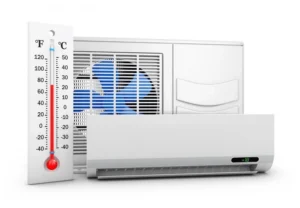
By Admin
Air conditioning and humidity control go hand in hand when creating a comfortable indoor environment. Discover how air conditioners help manage moisture levels and improve air quality.

Humidity plays a crucial role in determining how comfortable an indoor space feels. High humidity can make the air feel warmer than it is, leading to discomfort, excessive sweating, and even respiratory issues. On the other hand, low humidity can cause dry skin, irritation, and other health concerns. This is where air conditioning and humidity control become essential, as a well-functioning AC system helps maintain optimal moisture levels, ensuring a balanced and comfortable indoor environment. Are you looking for best AC repair during this humid climate?
This brings us to an important question: Can air conditioners reduce humidity?
The short answer is yes. But how do they do it, and how effective are they? Let’s explore the science behind it.
Air conditioners primarily function to cool the air, but they also play a significant role in humidity regulation. Here’s how they work:
While air conditioners are not dedicated dehumidifiers, they naturally help lower indoor moisture levels, especially when used efficiently.

Different AC types have varying levels of effectiveness in managing humidity:
Using an air conditioner that is too large for a space can cause short cycling, where the unit turns on and off too frequently. This results in less moisture removal, leading to a damp indoor environment. Choosing the right AC size is crucial for optimal air conditioning and humidity control.
In regions with naturally high humidity, air conditioners alone might not be enough. In such cases, combining AC use with a dehumidifier can enhance comfort.
A well-maintained AC unit with clean filters works more efficiently in managing both temperature and humidity. Regular servicing from a reputed air condition repair services can ensure your system functions at its best.
Poorly insulated or poorly ventilated homes may experience trapped moisture, making AC systems work harder to control humidity. Ensuring proper insulation and airflow can help maintain balanced humidity levels.

While AC units help with humidity control, they may not always be the best solution in extreme conditions. Here are some situations where additional measures may be required:
To enhance air conditioning and humidity control, consider these additional strategies:
If you want to know more about Effects of Air Conditioners on Your Daily Life then you can visit here
Many people believe that setting the AC to a lower temperature will automatically reduce humidity. However, this only cools the air faster without effectively removing excess moisture.
Ceiling fans improve air circulation but do not remove humidity. They can make the room feel cooler but won’t actually lower moisture levels.
While prolonged AC use can lower humidity significantly, modern air conditioners are designed to maintain a balanced indoor environment. If the air feels too dry, using a humidifier can help.
In high-humidity areas, dehumidifiers can complement AC units to maintain ideal moisture levels, preventing mold growth and musty odors.

While air conditioners naturally remove some moisture, they are not a replacement for a dedicated dehumidifier, especially in extremely humid conditions.
The optimal indoor humidity level should be between 30% and 50% for maximum comfort and air quality.
Signs of high humidity include condensation on windows, a musty smell, or a sticky, damp feeling in the air.
No, running the fan without cooling can actually increase humidity by recirculating warm, moist air.
It’s best to schedule AC maintenance at least once or twice a year to ensure it operates efficiently.
Air conditioners play a vital role in air conditioning and humidity control, helping to maintain a comfortable indoor climate. However, their effectiveness depends on various factors, including the type of AC, maintenance, insulation, and external conditions.
If your AC system isn’t managing humidity effectively, consulting the best ac repair services in Kolkata can help optimize its performance. Regular servicing, the right AC size, and additional humidity control methods can create the perfect indoor environment for comfort and health.